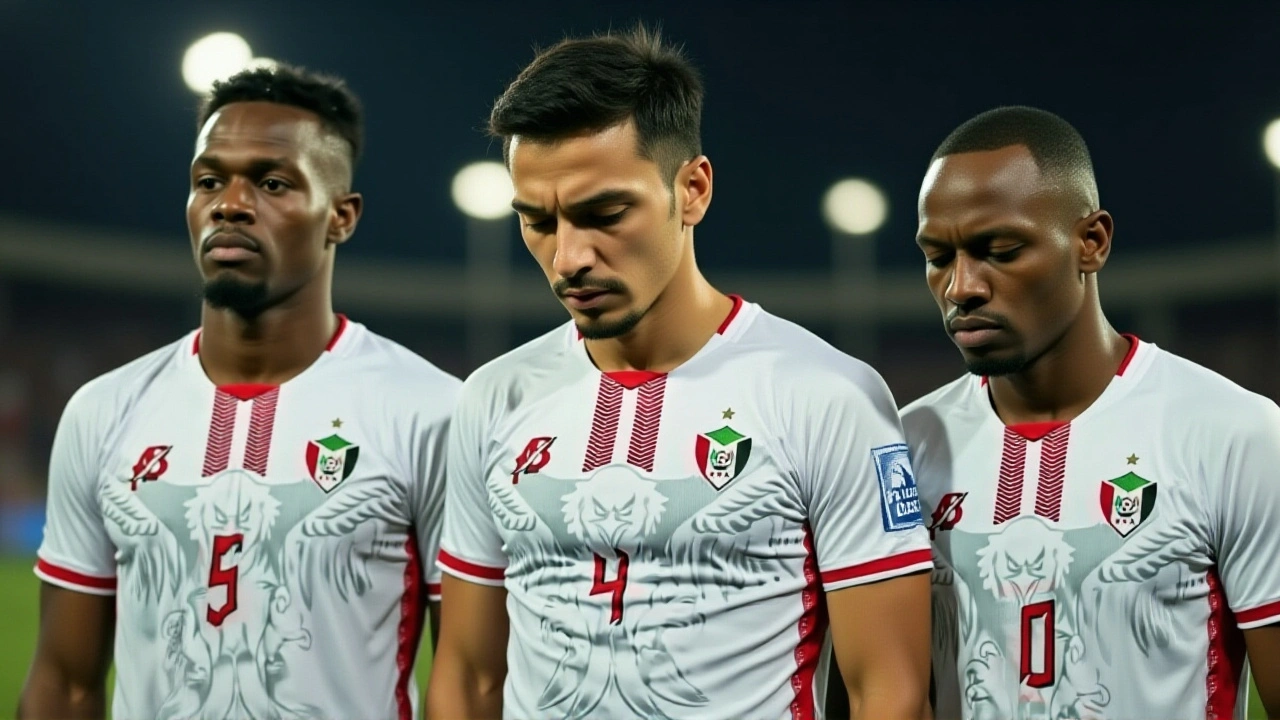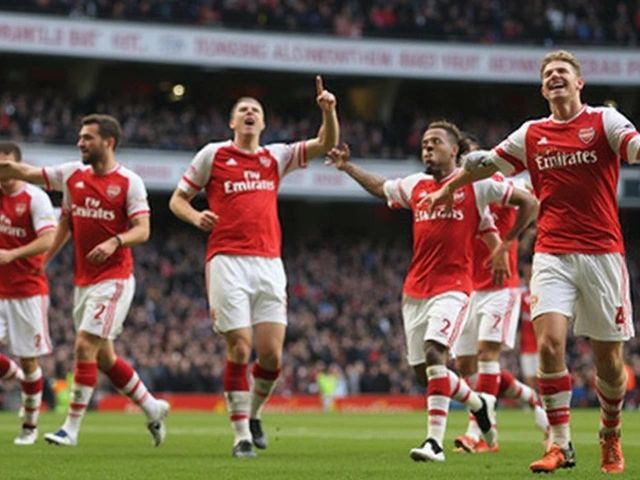In a match that could reshape Africa's 2026 World Cup picture, Togo edged Sudan 1‑0 on Tuesday, September 9, 2025, at the Stade de Kégué in Lomé. The breakthrough came just six minutes in when Sadik Fofana, a 24‑year‑old midfielder for French Ligue 2 side Valenciennes FC, hammered home the opening strike. Referee Andofetra Rakotojaona from Madagascar saw little else change the scoreline, and Sudan left the venue with its hopes hanging by a thread.
Group B Context and What Was at Stake
Group B of the CAF second‑round is a six‑team lottery featuring reigning African champions Senegal, the Democratic Republic of Congo, Mauritania, Togo, Sudan and South Sudan. Only the group winner earns a direct ticket to the tournament in North America, while the runner‑up drops into a playoff round. Going into the Lomé fixture, Sudan sat on four points after a surprise 1‑0 win over DR Congo, while Togo had collected five points from a draw with Senegal and a 1‑1 stalemate with Sudan two weeks earlier.
The clash was the third matchday of the round, and with only two windows left, every point mattered. A win for Sudan would have pulled them level with the Togolese side and kept the gap to leaders Senegal at a manageable three points. Instead, the early goal forced Sudan into a chase‑up mode for their remaining games against Mauritania and South Sudan.
Match Summary and Key Moments
From the first whistle, the atmosphere at the Stade de Kégué was electric. The home crowd of roughly 12,000 could be heard chanting “Allez les Éperviers” as the Togolese side pushed forward. In the sixth minute, a seamless one‑two between Fofana and striker Kodjo Laba split the Sudanese back line. Fofana drove the ball into the box and slipped a low left‑footed finish past goalkeeper Mohamed Al‑Ahmad. The net rippled, and the stadium erupted.
Sudan responded with intensity. Within the first half they rattled the post twice and forced Togo into a defensive shell. The Sudanese midfield generated 14 shots, five of which tested the goal, but none found the back of the net. Togo, on the other hand, mustered eight attempts, three on target, and relied heavily on disciplined defending.
Second‑half possession tilted toward Sudan, who dominated the midfield with a 58‑42% split. Yet the Togolese back line, marshalled by veteran centre‑back Samuel Blay, held firm. A controversial off‑side call in the 68th minute sparked debate, but the referee stuck to his decision, and the match ended as it began – 1‑0 in favor of the hosts.
Statistical Breakdown
- Shots: Sudan 14 (5 on target) vs. Togo 8 (3 on target)
- Possession: Sudan 58% vs. Togo 42%
- Pass accuracy: Sudan 81% vs. Togo 79%
- Fouls committed: Sudan 12, Togo 9
- Yellow cards: Sudan 2, Togo 1
Despite the numerical superiority, Sudan’s failure to convert left the scoreboard unchanged. The data underscores a classic football truth – quality beats quantity when moments are seized.
Reactions from Federations and Fans
At the post‑match press conference, Stanislas Gnankam Gamabé, president of the Togolese Football Federation, praised his players: “We showed resilience and took our chances early. This win puts us back in the conversation and gives the fans something to celebrate.”
Sudan’s chief, Muwla al‑Digair, expressed disappointment but remained hopeful: “It hurts, no doubt. Yet we have two games left. If we win against Mauritania and South Sudan, we can still fight for the runner‑up spot.” Fans in Lomé sang into the night, while Sudanese supporters, many of whom had traveled from Khartoum, left the venue in subdued silence.
Implications for the Qualification Race
With the result, Togo climbs to third place, sitting on five points and still in contention for the runner‑up slot. Sudan drops to fourth with four points, now trailing group leaders Senegal by four points and requiring wins in both of their final fixtures.
Senegal, already dominant with a 4‑0 victory over South Sudan, remains the favorite to clinch the direct berth. The shifting dynamics echo the broader African qualifiers, where traditional powerhouses Nigeria and Cameroon have stumbled, and the race for the nine direct slots has become a story of narrow margins.
The next match for Togo comes on October 13, 2025, when they face South Sudan at Juba Stadium. Sudan, meanwhile, will host South Sudan a week later, hoping to bounce back. Both encounters will decide whether Sudan can still salvage a playoff chance or will watch the tournament from the sidelines.
Looking Ahead: What’s Next for the Teams?
Coaches have already begun recalibrating tactics. Togo’s manager, Samuel Bislée, hinted at a more balanced approach for the upcoming fixture, aiming to protect a narrow lead while looking for a second goal. Sudan’s coach, Ahmed El‑Tahir, promised a “more clinical” performance, emphasizing set‑piece routines that could unlock a stubborn defense.
For the fans, the drama is far from over. The final two windows will determine which of these West‑Central African nations will walk onto the world stage in 2026.
Frequently Asked Questions
How does this result affect Sudan's chances of reaching the World Cup?
Sudan now sits fourth in Group B with four points, four points behind leaders Senegal. They must win both remaining games against Mauritania and South Sudan and hope the leader falters to keep any playoff hopes alive.
What does the win mean for Togo's qualification outlook?
Togo moves to third place with five points, staying within striking distance of the runner‑up slot. A victory over South Sudan could propel them into contention for the playoff berth.
Who scored the only goal and what is his background?
The goal was netted by Sadik Fofana, a 24‑year‑old midfielder who plays for Ligue 2 side Valenciennes FC and earned his first senior cap for Togo in 2022.
When and where is Togo's next World Cup qualifier?
Togo faces South Sudan on Monday, October 13, 2025, at Juba Stadium in Juba, South Sudan, kicking off at 15:00 local time (12:00 GMT).
How many direct World Cup slots does CAF have for 2026?
CAF is allocated nine direct qualification spots plus one intercontinental playoff berth for the 48‑team 2026 FIFA World Cup.




Wow, what a night for Togolese football, the way the crowd at Stade de Kégué erupted when Sadik Fofana slipped that low left‑footed finish was something you only hear about in legends. The early goal, just six minutes in, turned the entire complexion of the game, forcing Sudan to chase from the get‑go. It’s fascinating how the cultural fabric of Togo, with its deep love for the sport, can manifest in such a disciplined defensive display after that strike. The back line, marshalled by Samuel Blay, reminded us that African teams can combine flair with tactical rigidity. Even though Sudan dominated possession, the numbers tell a story of quality over quantity, something coaches across the continent should note. The stats – 58% possession for Sudan, 14 shots taken, yet only five on target – underline a classic case of missed opportunities. Meanwhile, Togo’s eight shots, three on target, were all about precision and patience. The referee’s decision to stick with the off‑side call at the 68th minute sparked debate, but the match stayed true to its early narrative: a single moment decides the fate. Fans chanting “Allez les Éperviers” echoed through Lomé, turning the stadium into a living tapestry of sound and hope. The victory not only lifts Togo to third place but also injects fresh belief into their qualifying campaign. With only two windows left, every point feels like a golden ticket, and this one is definitely shining. The Togolese Football Federation’s president praised the resilience, which is a testament to the growing professionalism in West‑Central African football. It also shows how smaller football nations can punch above their weight when they seize their chances early. From a broader perspective, this result shakes up the usual power dynamics, reminding us that football in Africa is increasingly unpredictable. The upcoming fixtures will be a true test of whether Togo can sustain this momentum against South Sudan. In any case, the match provided a vivid illustration of why the World Cup qualifiers are such a roller‑coaster for fans across the continent. So, let’s raise a glass to the Eperviers and hope the journey continues with the same tenacity.
That Sudanian defense was a pathetic circus, fumbling every chance like a blindfolded clown at a carnival, while Togo’s Fofana slapped the ball home with the swagger of a street‑artist painting a masterpiece. The whole match felt like a showdown between a heavyweight and a terrified mouse, and guess who roared louder? The referee barely blinked, letting the chaos unfold as if he’d been paid in peanuts. Sudan’s shots were nothing but fireworks that never lit, and Togo’s single strike was a laser beam cutting through the fog of incompetence. In short: Togo owned, Sudan was clueless.
The statistical sheet of this encounter reads like a textbook case in modern football analytics, where possession and shot volume do not automatically translate into victory. Sudan, with a superior 58 % share of the ball, attempted a total of fourteen attempts, yet only five found the target, illustrating a pronounced inefficiency in the final third. Conversely, Togo, possessing merely 42 % of possession, managed eight shots, three of which were on goal, and capitalized on one of them with surgical precision. This dichotomy underlines the maxim that quality often trumps quantity, a principle reiterated by countless coaches across continents. Moreover, the timing of the decisive goal – a mere six minutes into the match – reshaped the tactical battles that followed, forcing Sudan into a reactive stance rather than a proactive one. The early lead also afforded Togo the luxury of structuring a compact defensive block, anchored by veteran centre‑back Samuel Blay, whose positional awareness left little room for Sudanese forwards. When analyzing the heat maps, one observes Sudan’s midfield dominance, but their forward thrusts were repeatedly thwarted by disciplined interceptions and well‑timed tackles. The off‑side controversy at the 68th minute, though minor in the grand scheme, sparked a brief debate among spectators, yet the referee’s firm stance maintained the flow of the game. From a psychological standpoint, the early concession likely dented Sudan’s confidence, a factor that often proves decisive in high‑stakes qualifiers. The crowd’s exuberant chants, “Allez les Éperviers,” created an acoustic pressure that amplified the home team’s morale, an intangible yet potent element many sports psychologists would cite. In the broader context of CAF’s qualification dynamics, this result injects further volatility into a group traditionally dominated by the likes of Senegal. Togo’s ascent to third place with five points now reopens the dialogue about under‑dog narratives reshaping the tournament’s landscape. Looking ahead, the upcoming fixtures for both nations will serve as litmus tests: can Sudan recover their composure and convert dominance into goals, and can Togo sustain their efficiency against South Sudan? The answer will hinge on tactical adjustments, mental resilience, and perhaps a dash of luck. Ultimately, this match stands as a concise illustration of the beautiful game’s unpredictability, reminding analysts and fans alike that numbers tell only part of the story, while moments, such as Fofana’s low‑driven finish, write the headline.
The way Sudan bullied the midfield was almost poetic, but poetry without a punchline is just background noise, and Togo’s defense turned that noise into a silent wall. Samuel Blay’s reading of the game resembled a grandmaster’s foresight, cutting off passing lanes before they even formed. While the visitors rattled the post twice, the home side’s goalkeeper remained an unflappable sentinel, denying any redemption. It’s a classic lesson: dominate possession, but if you lack the killer instinct, the points slip away. Togo’s single strike, punctuated by Fofana’s swift movement, was the dagger that sealed the fate.
From the perspective of a proud African supporter, witnessing Togo upset a team like Sudan feels like watching a hidden gem finally get its shine on the continental stage. The early goal not only electrified the stadium but also sent a ripple through the entire region, showcasing that football glory is not reserved solely for the historically dominant nations. It’s a testament to the relentless work put in by the Togolese federation, the coaches, and the players who have to fight against limited resources and still manage to deliver moments of brilliance. In a continent where football is almost a second religion, stories like these inspire countless youngsters dreaming of one day wearing their national colors. Moreover, the disciplined defensive effort after the goal proved that Togo can adapt, showing tactical maturity beyond what many expected. The match also highlighted how crucial mental fortitude is in qualifiers; Sudan’s inability to capitalize on 14 shots demonstrates that sheer numbers cannot compensate for lacking composure. With the group now tighter than ever, every point feels like a lifeline, and Togo’s victory adds a fresh dose of optimism to their campaign. It also serves as a reminder to the giants, like Senegal, that their dominance can be challenged at any moment. The fans, chanting passionately, embodied the spirit of unity and pride that defines African football. Ultimately, this win may well be a turning point, not just for Togo, but for the entire narrative of under‑dogs rising against the odds in the journey toward the 2026 World Cup.
Analyzing the match data, it becomes evident that tactical discipline played a pivotal role in Togo’s success. While Sudan enjoyed higher possession, the conversion rate remained low, highlighting inefficiencies in the final third. Togo’s ability to stay compact after scoring limited space for opponents, a strategy often advocated by seasoned analysts. The early goal also allowed the team to control the tempo, reducing Sudan’s chances to build sustained pressure. Such observations reinforce the notion that effective game management can outweigh raw statistical dominance.
Just to add, the shot‑map shows Sudan’s attempts clustered on the left side, while Togo’s few chances came from the right‑hand channel, which explains why Fofana found that sweet spot. Also, the pass accuracy was almost neck‑and‑neck – 81 % for Sudan vs. 79 % for Togo – so it really boiled down to finishing. Hope that clears things up!
Well played, Togo! 😎👏
That deep dive really hits the nail on the head, the numbers paint a clear picture of how efficiency beats volume, and it’s fascinating to see how the early goal set the tone for the whole game. The psychological impact of conceding so early can’t be overstated, it forces the opponent to chase, often leading to gaps that the defending side can exploit later on. It also shows why coaches emphasize converting high‑quality chances rather than racking up shots; each missed opportunity adds pressure, especially in a high‑stakes qualifier. Plus, the crowd energy you mentioned – “Allez les Éperviers” – acts like an extra player, lifting morale and making the home side even more resilient. All in all, this match is a perfect case study for anyone interested in the balance between possession, chance creation, and clinical finishing. 🚀⚽️
i swear the ref was on sudan's side, like they planted something in the ball or somethin. Can't trust anythin now.
Let's keep the momentum going, Togo! Every point you earn brings the dream a step closer, and the fans are already buzzing with excitement. Stay focused, play with heart, and remember that the road to the World Cup is built on moments like this victory. Onward to the next challenge – you’ve got this!
Oh sure, because a single goal guarantees you’ll magically qualify, right? Let’s see how that optimism holds up when the real pressure hits.